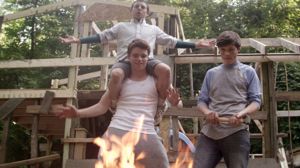Even if you end up having a long and illustrious career in Hollywood, I'll bet good money that _The Kings of Summer _will forever be your calling card. Every frame feels carefully populated with joy, heartbreak, and hope. Your production design in this film isn't just impressive - it's moving. Like an emotional time capsule, each set piece transported me back into adolescence. Not by recreating a specific era, but by evoking an overall feeling. That's a rare gift to get from a film.
Frankly, I never wanted to leave this rebellious teenage world you built in the wilderness.
If that wasn't enough, I think you've also patented a hot new architectural style: shabby nostalgia chic. And boy, does it work.
The "shabby" part of your designs are obvious but endearing. The story opens with Joe (Nick Robinson) rushing to finish one of the sorriest looking birdhouses ever assembled. The lopsided construction and mismatched materials are good for a laugh, but also contribute to building his character; Joe's class project doesn't represent hard work or professional aspirations, it's just a sloppy last-minute failure. He's a good looking, well-off suburban kid who can't seem to get along with his dad (Nick Offerman) and takes out his pent-up frustration one slow-motion hammer blow at a time. When Joe, his best friend Patrick (Gabriel Basso), and tag-along Biaggio (Moises Arias) decide to run away to the forest together, that haphazard birdhouse proves to be a dry run for the sanctuary they plan to build.
This summer project depends on a collection of discarded items, from recovered building materials to pieces of a port-a-potty. The way these elements all come together to create this fortress of solitude feels both authentic and "only in the movies." Like the film's slick cinematography, with its beautiful long-lens shots, your work also qualifies as "chic". In other words, simultaneously elegant and unhinged. The film, as well, is glossy enough for a wide theatrical release, but doesn't suffer from the glaze of studio money that often imposes nicer homes, over-aged "young stars", watered-down writing, and all the other pitfalls that give coming-of-age films that suffer from a sense of detachment from the material.
The true master stoke of this film is the most intangible: nostalgia. This is a dangerous influence to incorporate, being highly personal and potentially alienating. But instead of setting the film in the past and filling it with pop culture references, we get a contemporary story where wistful feelings arise simply by letting director Jordan Vogt-Roberts expose the seams and rough edges of youth. The love story in the film between Joe and Kelly (Erin Moriarty) is appropriately clumsy and frustrating, and the friendship between the boys bounces between silly and serious with the appropriate momentum of a teenage mood swing.
The final film swings back and forth in style and tone, too, but ultimately everything comes wonderfully together.
Championing this film by design,
Christopher







